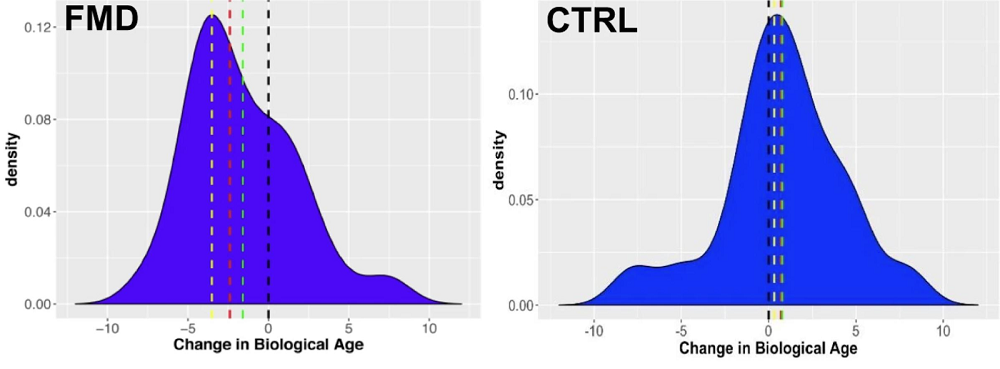A new study into Valter Longo’s fasting-mimicking diet shows metabolic and immune benefits that, according to a simulation, might translate into years of additional lifespan [1].
Fasting in disguise
Caloric restriction is among the most powerful life-extending interventions in mice [2]. However, there is a lack of experimental data on its effect on human lifespan. Continuous caloric restriction is also very hard to maintain in humans in real life. Several substitutes have been proposed, such as time-restricted eating (intermittent fasting) and periodic long-term fasting.
USC Leonard Davis School Professor Valter Longo, a renowned geroscientist, has long been advocating for a particular type of caloric restriction, a fasting-mimicking diet (FMD). FMD has shown promising results in mice [3], including lifespan extension, and it has already been tested in humans.
FMD consists of cycles of normal eating interspersed with five days of plant-based, low-calorie, and low-protein meals. According to Longo, this type of caloric restriction is easier to maintain than an actual water fast, while still recapitulating many of the latter’s beneficial effects.
FMD against fatty liver and immunosenescence
In this new study published in Nature Communications, Longo and his team analyzed additional data from two previous studies, focusing on body composition, liver adiposity, metabolic metrics, and biological age. Those studies, which included three FMD cycles, already showed reductions in body weight, trunk and total body fat, and blood pressure without any adverse effects.
Abdominal obesity is strongly associated with non-alcoholic fatty liver disease (NAFLD), which is a known risk factor in several diseases. According to this study’s analysis, the hepatic fat fraction was substantially reduced by FMD, especially in the participants who had already crossed the NAFLD threshold, showing that FMD has a considerable therapeutic potential against fatty liver.
FMD also reduced body mass index (BMI) and total body fat. In participants who were obese at baseline (BMI>25), the diet decreased both subcutaneous fat and the more detrimental visceral fat. The researchers also analyzed insulin resistance using HOMA-IR, a commonly used composite metric, and found that insulin resistance was significantly reduced by FMD in pre-diabetic participants.
Interestingly, FMD also seemed to partially reverse a collection of age-related changes in the immune system known as immunosenescence. One of its hallmarks is the shift in the lymphoid-to-myeloid ratio, which refers to two major categories of immune cells. Lymphopoiesis produces B, T, and natural killer cells, which are central to immune defenses. With age, this process dwindles, leading to a skewed lymphoid-to-myeloid ratio. Consistent with previous studies in mice, FMD significantly reversed that decline.
Reduction in biological age
Humans’ long lifespan has caused scientists to seek proxy metrics of biological age for clinical studies. The researchers used a composite biological age score previously tested in the large-scale NHANES and CALERIE studies. According to this score, three FMD cycles reduced median biological age by 2.6 years. Interestingly, no significant association was found between reductions in BMI and in biological age, showing that weight loss was not a major factor. Rather, four other metrics were significantly associated with the change in biological age: the hepatic function marker albumin, inflammatory C-reactive protein (CRP), the long-term glucose marker Hba1c, and systolic blood pressure. Participants who had obesity, elevated CRP, elevated fasting glucose, or systolic hypertension showed an even greater decrease in biological age of 2.9 years after undergoing FMD.
Interestingly, no significant association was found between reductions in BMI and in biological age, showing that weight loss was not a major factor. Rather, four other metrics were significantly associated with the change in biological age: the hepatic function marker albumin, inflammatory C-reactive protein (CRP), the long-term glucose marker Hba1c, and systolic blood pressure. Participants who had obesity, elevated CRP, elevated fasting glucose, or systolic hypertension showed an even greater decrease in biological age of 2.9 years after undergoing FMD.
A reduction in biological age is associated with but not equal to an increase in predicted life expectancy. When the researchers tried to estimate the latter, they found that FMD increased median predicted life expectancy from 82.2 to 83.5 years.
However, those results only captured the effects of three FMD cycles. The researchers tried to predict what the effect on life expectancy would be if people continued to practice periodic FMD. In their model, the effect of each three FMD cycles became less and less dramatic, which is to be expected; a health-promoting intervention is most effective when first applied to a relatively unhealthy organism. Reductions in biological age were eventually replaced by a slower-than-chronological-age increase.
According to that model, if someone were to undergo three FMD cycles annually, that person would only be gaining 0.85 years of biological age for every one-year increase in your chronological age. Accordingly, if this regimen of three annual cycles started at the age of 50, life expectancy at 70 would be about five years higher than without FMD: 88.3 years vs 83.2 years. Of course, this is only a model, and the authors admit that “there are major limitations that need to be acknowledged in regards to our simulation.”
Despite those limitations, these results are intriguing. “This study shows for the first time evidence for biological age reduction from two different clinical trials, accompanied by evidence of rejuvenation of metabolic and immune function,” Longo said in a press release.
Literature
[1] Brandhorst, S., Levine, M.E., Wei, M. et al. (2024) Fasting-mimicking diet causes hepatic and blood markers changes indicating reduced biological age and disease risk. Nat Commun 15, 1309
[2] Swindell, W. R. (2012). Dietary restriction in rats and mice: a meta-analysis and review of the evidence for genotype-dependent effects on lifespan. Ageing research reviews, 11(2), 254-270.
[3] Longo, V. (2022). PERIODIC FASTING MIMICKING DIET, LONGEVITY, AND DISEASE. Innovation in Aging, 6(Suppl 1), 91.
View the article at lifespan.io









































